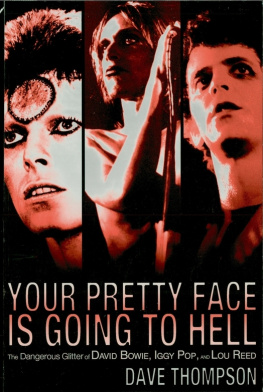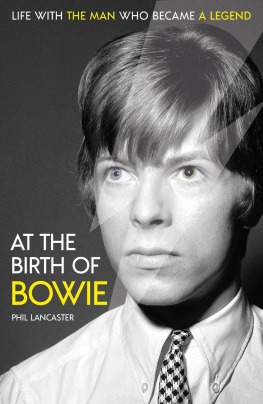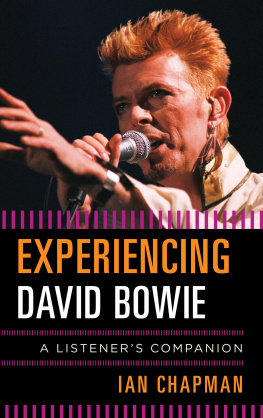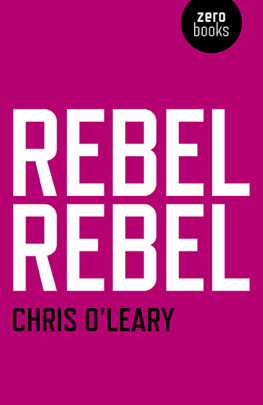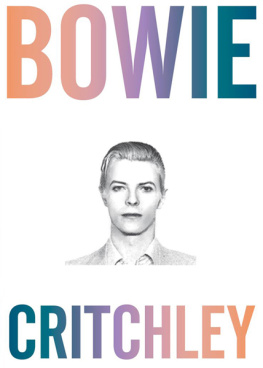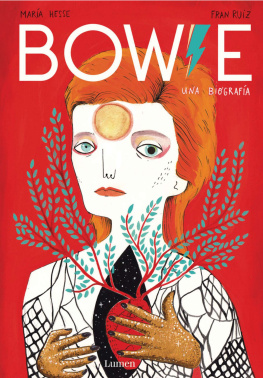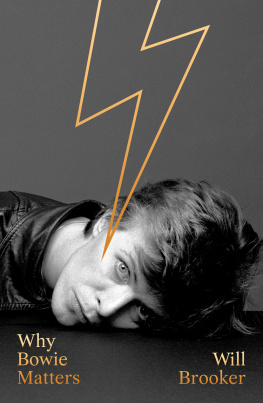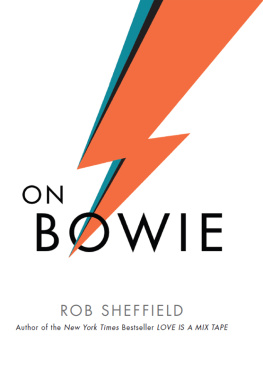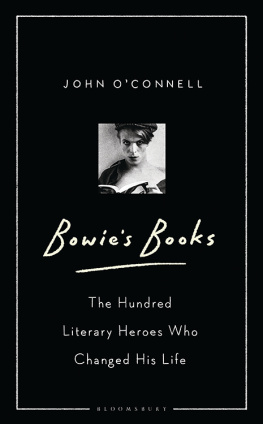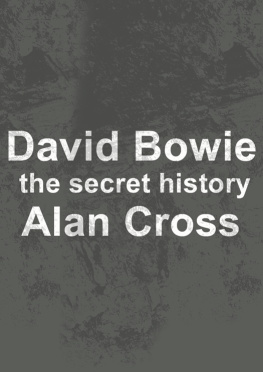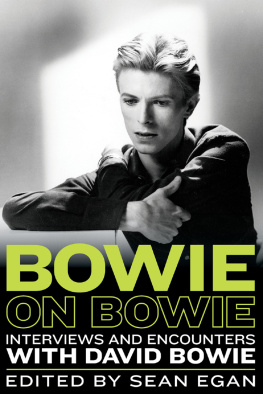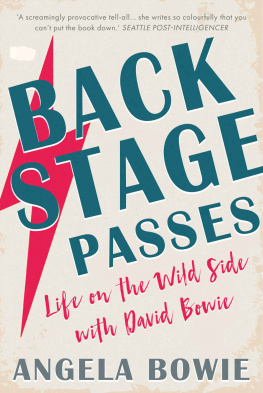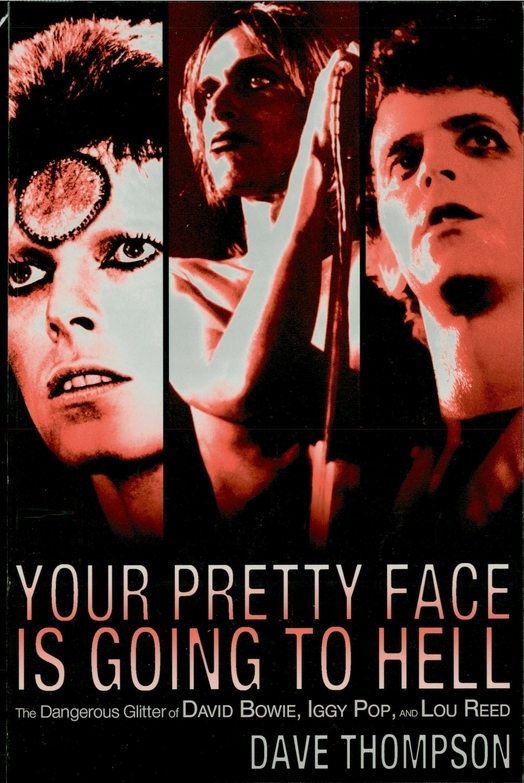ACKNOWLEDGMENTS
To say that David Bowie, Iggy Pop, and Lou Reed have sound-tracked my life is a little like saying my cross-eyed cat Oliver looks a little strange. Its something I dont even think about; the shelves upon shelves of their music that dominate my CD/vinyl/eight-track collection are as much a part of the furniture as the shelves themselves, and I doubt a week goes by when I dont listen to some music by at least one of them. There was even a time when it was a daily ritual.
This book is not my first investigation of their lives; as both an author and a journalist, I have probably spent more hours writing about the sprawling family trees that emanate from the careers of Bowie, Pop, and Reed than every other artist put together. So the most important thank-you of all has to go to this holiest of trinities, simply for keeping me so happily occupied over the past thirty years; and especially to Iggy and Lou, for the very entertaining interviews that weve conducted over the years.
I also owe a lot to Nico, who once spent an entire afternoon talking with a starstruck fan, providing me with the framework of this book more than twenty-five years before I ever thought of writing it.
And then: Gratitude and thanks for the chat to: Gaye Advert, Willie Alexander, Ron Asheton, Trevor Bolder, Angela Bowie, John Cale, Leee Black Childers, Jayne County, Tony Defries, Gus Dudgeon, Dana Gillespie, Bob Grace, Brian James, Ivan Kral, Jimi Lalumia, Phil Lynott, Phil Manzanera, Lawrence Myers, Peter Noone, Andrew Loog Oldham, Kenneth Pitt, Tim Renwick, Scott Richardson, Mick Rock, Mick Ronson, Susie Ronson, Yvonne Ruskin, Tony Secunda, TV Smith, Scott Thurston, Maureen Tucker, Cherry Vanilla, Mike Vernon, Tony Visconti, Overend Watts, Doug Yule, Tony Zanetta.
Id also like to thank Ken Sharp and Mark Johnston; Kenneth Pitt, for opening his Andy Warhol archive to me; and Paul Trynka, author of the ever-astounding Iggy Pop: Open Up and Bleed biography, for sharing interviews (the Riot Squad, Laurence Thibault, Phil Palmer, James Williamson, and Iggy) and confidences, and for salving my anxieties over the more minute pieces of detail. Paul was writing his own Bowie biography as I completed this book, and I cannot wait to read it.
Mike Edison, Jessica Burr, and Aaron Lefkove at Backbeat Books and copy editor Polly Watson.
Malcontent Pictures for permission to quote from the TV Smith documentary Uncharted Wrecks of Wonder: The Story of the Adverts and TV Smith.
And finally, to the family and friends who were around while I cranked Take No Prisoners up as loud as it would go: Amy Hanson, Jo-Ann Greene, Jane Hanson, Jenny and James, Linda and Larry, Phil and Paula, Sue and Tim, Deb and Roger, Dave and Sue, Oliver, Toby and Trevor, Jenny W, Karen T, Vaughan Funnell, Anchorite Man, Bateerz and family, Chrissie Bentley, Blind Pew, Mrs. B. East, Gef the Talking Mongoose, the Gremlins who live in the heat pump, Geoff Monmouth, Naughty Miranda, Nutkin, a lot of Thompsons, and Neville Viking.
EPILOGUE
Why end the story there? Why not continue on, through Bowies internationally chart-topping revision of China Girl, and the enduring loyalty that saw Bowie include further Pop songs on both Tonight (1984) and Never Let Me Down (1986)? The full-scale reunion, conspiring to create Iggys own first hit record, 1986s Blah Blah Blah?
Why not chase through to 1997, and his live reconciliation with Lou Reed, replaying their Save the Whales performance at a Madison Square Garden party, at the end of Bowies fiftieth birthday bash? Or forward a few years more, to Bowie contributing some vocals to Reeds The Raven album, a collection of verse built round Edgar Allan Poe?
Why not cover the Velvet Underground reunion in 1992, or the Stooges reformation in 2003? Motts return in 2009? Bowies self-revitalization in the years around the millennium? There have been so many highlights in the last thirty years, there must be a chapter or two to wring out of them?
Maybe there is. But thats all it would be, a wringing-out of detail and document, a hop-frog through a series of incidents that may each have a tale to tell, but which really arent a story. Not this story, anyway. China Girl was massive, but it was also embarrassing. Blah Blah Blah was a hit, but it was horrible as well, the worst record Iggy Pop had ever put his name toand coming hot on the heels of Bowies worst ever, the truly execrable Tonight, was anybody surprised at that?
The reunions were great if you dont care about age, and the fact that a band matters most because it exists in its own time and place, not because the members are thirty years older and still remember the tunes. Nostalgia exists so that we can all relive our distant pasts. But memory is intangible for a reason. You can never go back, not really.
Oh, and Madison Square Garden? Lou Reed was there, but Iggy Pop wasnt, and neither was anyone else with whom youd associate the birthday boy. A cynic might look at the lineup, in fact, and wonder whose benefit it was all really for? Bowies? Or the cable TV cameras that were broadcasting it live, and wanted to make sure there was some star power showing, to justify breaking in to their scheduled programming?
All three men have made some great records in the years since that night at the Chelsea Rendezvous. True, the 1980s were uniformly bad, and if anyone can listen to Lou Reeds Little Red Joystick without gagging a little, then well play you Iggys Candy immediately after. Followed by Bowies Day In Day Out.
Slowly, however, the worms turned. Reed was first, winding up that hateful decade with his finest album since Street Hassle, and maybe even better than that. New York was more than a return to songwriting form, it was a return to meaningful observation as well, and across the albums that have flowed since then, you get the feeling that he has finally settled into life as Lou Reed; that he no longer feels the need to compete with kids who are three generations younger than him, and who will always look better on YouTube than he does. He makes records for himself these days, and people dont even shy away from the unexpected ones.
In 2007, Reed released Hudson River Wind Meditations, an album of tai-chi-inspired mood music that was as pastoral as Metal Machine Music was grating. But nobody called him a madman for doing so; nobody accused him of ripping off the kids. It was what it was, and if the world has learned any one thing over the past three decades, it is that an artist is always worth more when he follows his own heart than when he does what everyone else says he ought to. And it was Lou Reed who taught it that lesson.
Iggy was next to cast off the cobwebs. American Caesar, in 1993, was a jewel, stepping back from the hackneyed rent-a-Pop noises hed been making since Blah Blah Blah, and again letting his songs speak louder than the sounds. He can still be crass when he wants to, and leading the reunited Stooges into the studio to record the abysmal The Weirdness was proof that even the greatest intentions have their dark sides.
But the reunion brought Ron Asheton some joy through what turned out to be the last years of his lifeshortly before he died in January 2009, the old trouper looked back on the days of the original Stooges and said that they felt like a dream. Now he was reliving that dream, and friends were convinced that hed never been happier. Maybe The Weirdness prevented the rest of us from sharing that emotion, but it doesnt really matter now, does it? James Williamson slipped in to fill the late Rons shoes, the Ruw Power album is back on the stage boards, and at the present pace of events, the band should be ready to self-destruct Metallic KO style sometime around the year 2012.

